Eppp guide Study guides, Class notes & Summaries
Looking for the best study guides, study notes and summaries about Eppp guide? On this page you'll find 93 study documents about Eppp guide.
Page 4 out of 93 results
Sort by
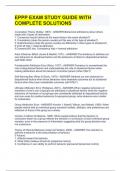
-
EPPP EXAM STUDY GUIDE WITH COMPLETE SOLUTIONS
- Exam (elaborations) • 28 pages • 2024
-
Available in package deal
-
- $16.49
- + learn more
Covariation Theory (Kelley, 1967) - ANSWER-Behavioral attributions about others made with 3 types of information: 1. Consensus (would others do the same thing in the same situation?) 2. Consistency (does the person usually act this way in this type of situation?) 3. Distinctiveness (does the person usually act differently in other types of situations?) If CCD all high = external attribution if Consensus/D low; Consistency high = internal attribution Actor-Observer Effect (Jones & Nes...
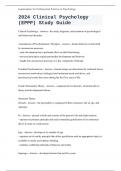
-
2024 Clinical Psychology (EPPP) Study Guide
- Exam (elaborations) • 31 pages • 2024
-
- $8.49
- + learn more
Clinical Psychology - Answer-- the study, diagnosis, and treatment of psychological and behavioral disorders Assumptions of Psychodynamic Therapies - Answer-- human behavior is motivated by unconscious processes - early development has a profound effect on adult functioning - universal principles explain personality development and behavior - insight into unconscious processes is a key component of therapy Freudian Psychoanalysis - Answer-- human beings are determined by irrational forces...
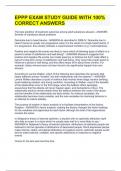
-
EPPP EXAM STUDY GUIDE WITH 100% CORRECT ANSWERS
- Exam (elaborations) • 25 pages • 2024
-
Available in package deal
-
- $16.49
- + learn more
The best predictor of treatment outcomes among adult substance abusers - ANSWER-Severity of substance abuse problems Dementia due to head trauma - ANSWER-As described in DSM-IV, Dementia due to Head Trauma is usually non-progressive when it is the result of a single head trauma. If it is progressive, this usually indicates a superimposed condition (e.g., hydrocephalus). Positive and negative life events are likely to have which of following types of effect on a person's sense of satisfact...
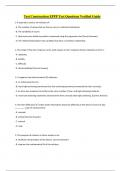
-
Test Construction EPPP Test Questions Verified Guide
- Exam (elaborations) • 17 pages • 2024
-
Available in package deal
-
- $9.79
- + learn more
Test Construction EPPP Test Questions Verified Guide 1. R-squared is used as an indicator of: - A. The number of values that are free to vary in a statistical calculation - B. The variability of scores - C. How much your ability to predict is improved using the regression line (Correct Answer) - D. The relationship between two variables that have a nonlinear relationship 2. The slope of the item response curve, with respect to item response theory, indicates an item's: - A. reliability - B....
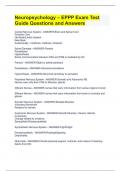
-
Neuropsychology – EPPP Exam Test Guide Questions and Answers
- Exam (elaborations) • 17 pages • 2024
-
Available in package deal
-
- $14.49
- + learn more
Central Nervous System - ANSWER-Brain and Spinal Cord Primitive Core Old Brain/Limbic System New Brain Anatomically - hindbrain, midbrain, forebrain Spinal Damage - ANSWER-Paresis Parasthesia Hypersthesia Some communication between CNS and PNS is mediated by SC Paresis - ANSWER-Slight or partial paralysis Parasthesia - ANSWER-Abnormal sensations Hypersthesia - ANSWER-Abnormal sensitivity to sensation Perpheral Nervous System - ANSWER-Somatic and Autonomic NS Nerves carr...
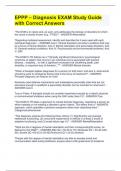
-
EPPP – Diagnosis EXAM Study Guide with Correct Answers
- Exam (elaborations) • 23 pages • 2024
-
Available in package deal
-
- $16.49
- + learn more
"The DSM is in nature and, as such, only addresses the etiology of disorders for which the cause is clearly known (e.g., PTSD)." - ANSWER-Atheoretical "Regarding multiaxial assessment, identify and describe the 5 axes used with each individual diagnosis." - ANSWER-Axis I: Clinical disorders and other conditions that may be a focus of clinical attention; Axis II: Mental retardation and personality disorders; Axis III: General medical conditions; Axis IV: Psychosocial and environmental prob...
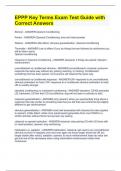
-
EPPP Key Terms Exam Test Guide with Correct Answers
- Exam (elaborations) • 14 pages • 2024
-
Available in package deal
-
- $14.49
- + learn more
Skinner - ANSWER-Operant Conditioning Pavlov - ANSWER-Classical Conditioning; tone and meat powder Watson - ANSWER-Little Albert, stimulus generalization, classical conditioning Thorndike - ANSWER-Law of effect (if you do things that are followed by reinforcers you will do them more), Operant conditioning Classical vs Operant Conditioning - ANSWER-Classical: 2 things are paired; Operant : reinforcement unconditioned vs conditioned stimulus - ANSWER-unconditioned= universal, ever...
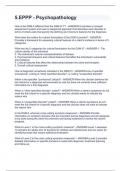
-
EPPP – Psychopathology Exam Test Guide Questions and Answers
- Exam (elaborations) • 20 pages • 2024
-
Available in package deal
-
- $16.49
- + learn more
How is the DSM-5 different than the DSM-IV T? - ANSWER-It provides a nonaxial assessment system and uses a categorical approach that describes each disorder in terms of criteria sets that specify the defining and minimum features for the diagnosis. What does the outline for cultural formulation of the DSM 5 provide? - ANSWER-Provides a framework for assessing cultural features of a client's problems in terms of 5 categories What are the 5 categories for cultural formulation for the DSM 5?...
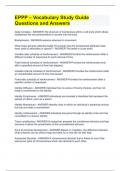
-
EPPP- Examination for Professional Practice in Psychology Exam Bundle (100% Pass)
- Package deal • 61 items • 2024
-
- $50.49
- + learn more
Exam (elaborations) EPPP – Vocabulary Study Guide Questions and Answers Exam (elaborations) EPPP – Psychopharmacology Exam Guide Questions and Answers Exam (elaborations) EPPP - Physiological Psychology Exam Questions with Verified Answers Exam (elaborations) EPPP - Memory and Forgetting Exam Test Guide and Answers Exam (elaborations) EPPP
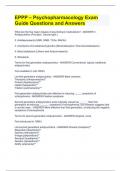
-
EPPP – Psychopharmacology Exam Guide Questions and Answers
- Exam (elaborations) • 9 pages • 2024
-
Available in package deal
-
- $11.49
- + learn more
What are the five major classes of psychotropic medications? - ANSWER-1. Antipsychotics (First gen., Second gen.) 2. Antidepressants (SSRI, SNRI, TCAs, MAOIs) 3. Anxiolytics and sedatives/hypnotics (Benzodiazepine / Non-benzodiazepine) 4. Mood stabilizers (Lithium and Anticonvulsants) 5. Stimulants Terms for first generation antipsychotics - ANSWER-Conventional, typical, traditional antipsychotics First available in mid-1950's List first generation antipsychotics - ANSWER-...

Study stress? For sellers on Stuvia, these are actually golden times. KA-CHING! Earn from your study resources too and start uploading now. Discover all about earning on Stuvia


